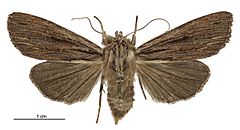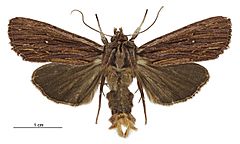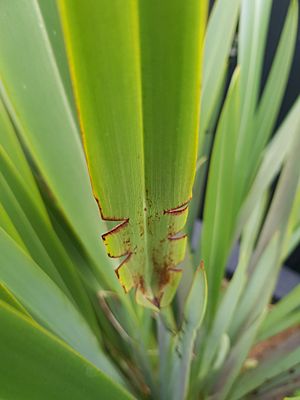Flax notcher moth facts for kids
Quick facts for kids Flax notcher moth |
|
|---|---|
 |
|
| Female | |
 |
|
| Male | |
| Scientific classification | |
| Kingdom: | |
| Phylum: | |
| Class: | |
| Order: | |
| Family: | |
| Genus: |
Tmetolophota
|
| Species: |
T. steropastis
|
| Binomial name | |
| Tmetolophota steropastis (Meyrick, 1887)
|
|
| Synonyms | |
|
|
The flax notcher moth, also known as Tmetolophota steropastis, is a cool type of moth. It belongs to a family of moths called Noctuidae. This special moth lives only in New Zealand. Its caterpillars, which are the young moths, love to munch on New Zealand flax plants. When they eat the leaves, they make little notches. This damage means the flax leaves cannot be used for weaving.
Contents
Discovering the Flax Notcher Moth
Scientists give every living thing a special name. This helps them study and understand nature better. The flax notcher moth was first described in 1887. A scientist named Edward Meyrick gave it the name Mamestra steropastis back then. Later, scientists decided it fit better in the Tmetolophota group.
What Does it Look Like?
The caterpillars of the flax notcher moth are easy to spot. They have cool dark and light stripes all along their bodies. When these caterpillars grow up into adult moths, their front wings are about 16 to 20 millimeters long. That's about the length of a small paperclip!
Where Does it Live?
The flax notcher moth is special because it is endemic to New Zealand. This means you won't find it living naturally anywhere else in the world! It is quite common and can be found all over the country.
Habitat and Host Plant
The caterpillars of the flax notcher moth have a favorite food. They love to eat the leaves of the New Zealand flax plant, which is also called Phormium tenax. This plant is their "host plant" because it's where they live and get their food.
How it Affects People
The flax notcher moth caterpillars are sometimes seen as a pest. This is because they chew special notches into the sides of the flax leaves. People in New Zealand have traditionally used flax leaves for weaving. They make baskets, mats, and other crafts. When the leaves have these notches, they are not as good for weaving.


